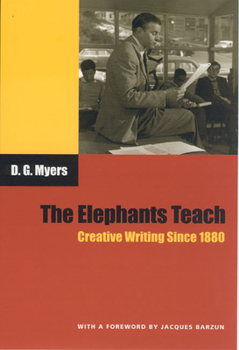The Elephants Teach: Creative Writing Since 1880
When Vladimir Nabokov was up for a chair in literature at Harvard, the linguist Roman Jakobson protested: "What's next? Shall we appoint elephants to teach zoology?" That anecdote, with which D. G. Myers begins The Elephants Teach, perfectly frames the issues this book tackles. Myers explores more than a century of debate over how writing should be taught and whether it can or should be taught in a classroom at all. Along the way, he...
Format:Paperback
Language:English
ISBN:0226554546
ISBN13:9780226554549
Release Date:June 2006
Publisher:University of Chicago Press
Length:256 Pages
Weight:0.90 lbs.
Dimensions:0.7" x 6.1" x 8.9"
Customer Reviews
5 ratings
elephants teach
Published by Thriftbooks.com User , 13 years ago
Perfect condition, the past users underlines helped too! The book is an arduous read but I have to know it so I'm glad I can share the experience with those who have gone before me.
Great experience
Published by Thriftbooks.com User , 13 years ago
Product was mailed immediately and arrived in great conditionThe Elephants Teach: Creative Writing Since 1880.
Very Clear, Systematic History of Creative Writing
Published by Thriftbooks.com User , 17 years ago
As a teacher of writing, I found this book extremely interesting and clear. Myers provides a lucid, organized history of the evolution of the teaching of creative writing in this country. While the book will likely not appeal to a layperson, anyone who plans to teach creative writing or enroll in an expensive creative writing program has a stake in what Myers is saying. I am surprised by other reviewers' comments about Myers' view of creative writing (MFA) programs. Unlike other reviewers, I did not find Myers' remarks venomous or even especially harsh; rather, I found them even-handed and common-sensical.
Hasn't left my mind for two years
Published by Thriftbooks.com User , 20 years ago
I have a masters degree in writng and this book was assigned during the intro-to-the-writing-program course. It changed my perspective, entirely, about what I'd planned to do after graduating. It changed my opinion of writing programs and of masters degrees in writing. The book makes a valid point. That said, the real world hasn't caught up to this little gem. We still need our degrees, unless we get lucky and publish something best selling, lavishly reviewed, become famous some other way, or some such thing. But this notion that MFAs in Writing beget teachers in MFA programs in Writing is a powerful one. Academia is insular; we knew this already (this isn't my first advanced degree), but somehow that the most important element of my degree is that it's the qualification to teach in my own program is a powerful lesson. We teach writers to become teachers who teach writers to become teachers who teach writers to become teachers...
A must-read for writing teachers
Published by Thriftbooks.com User , 24 years ago
Despite (or perhaps because of) its controversial conclusions, The Elephants Teach is a must-read for anyone involved in teaching writing. This fascinating and detailed analysis of the rise and development of "Creative Writing" in America raises important questions about the purpose of teaching writing, and if the answers are sometimes uncomfortable they are nevertheless thought-provoking. Though he asserts that after the Second World War "Creative Writing programs became a machine for creating more creative writing programs" (146), Myers is not ready to pull the plug; instead, he gently urges breaching the wall separating creative writing and scholarship in order to improve both disciplines. In an illuminating passage, he quotes poet Robert Pinsky on how the distinction between creative writing and scholarship works to the detriment of both: "On one side there is 'an immense elaboration of the techniques of composition' accompanied by 'a fatal ignorance of the past'; on the other side an 'elaborate sophistication regarding poetic theory' that goes with 'a fatal ignorance of composition.' The consequence, he said, is 'rhetorical pedantry in the poets; and arid nihilism in the critics.' Technique had been divorced from theory--composition from the past--as each section of the English deparment sought to perfect its own specialty" (168). It is clear that Myers would like to see creativity and criticism, poetry and scholarship join hands, enabling the Academy to produce not just writing programs but writers.




